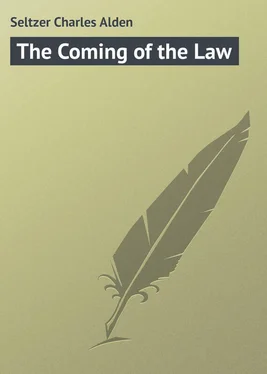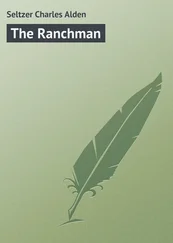Charles Seltzer - The Coming of the Law
Здесь есть возможность читать онлайн «Charles Seltzer - The Coming of the Law» — ознакомительный отрывок электронной книги совершенно бесплатно, а после прочтения отрывка купить полную версию. В некоторых случаях можно слушать аудио, скачать через торрент в формате fb2 и присутствует краткое содержание. Жанр: foreign_prose, foreign_adventure, на английском языке. Описание произведения, (предисловие) а так же отзывы посетителей доступны на портале библиотеки ЛибКат.
- Название:The Coming of the Law
- Автор:
- Жанр:
- Год:неизвестен
- ISBN:нет данных
- Рейтинг книги:5 / 5. Голосов: 1
-
Избранное:Добавить в избранное
- Отзывы:
-
Ваша оценка:
- 100
- 1
- 2
- 3
- 4
- 5
The Coming of the Law: краткое содержание, описание и аннотация
Предлагаем к чтению аннотацию, описание, краткое содержание или предисловие (зависит от того, что написал сам автор книги «The Coming of the Law»). Если вы не нашли необходимую информацию о книге — напишите в комментариях, мы постараемся отыскать её.
The Coming of the Law — читать онлайн ознакомительный отрывок
Ниже представлен текст книги, разбитый по страницам. Система сохранения места последней прочитанной страницы, позволяет с удобством читать онлайн бесплатно книгу «The Coming of the Law», без необходимости каждый раз заново искать на чём Вы остановились. Поставьте закладку, и сможете в любой момент перейти на страницу, на которой закончили чтение.
Интервал:
Закладка:
Seltzer Charles Alden
The Coming of the Law
CHAPTER I
THE ARRIVAL OF THE MAN
If the passengers on the west-bound train that pulled up at the little red wooden station at Dry Bottom at the close of a June day in 18–, were interested in the young man bearing the two suit cases, they gave no evidence of it. True, they noted his departure; with casual glances they watched him as he stepped down upon the platform; but immediately they forgot his athletic figure and his regular featured, serious face as their thoughts returned to the heat, the dust, and the monotony of travel.
There was the usual bustle and activity which always follows the arrival of a train. A mail bag was dumped out of the mail car, another thrown in; some express packages were unceremoniously deposited near the door of the station by the agent; the conductor ran to the telegrapher’s window to receive an order; ran back, signaling as he ran; the engine bell clanged, the drivers clanked, the wheels ground, the passengers sighed, and the train departed on its way.
The young man who had alighted stood motionless for a moment, listening to the clatter of the wheels over the rail-joints, watching the smoke from the engine-stack befoul the clear blue of the sky. Then he smiled grimly, threw a rapid glance toward a group of loungers standing at a corner of the station, and walked over to where the station agent stood examining some newly arrived packages.
“Do you mind directing me to the courthouse?” said the young man.
The agent looked up, turned, and ran a measuring, speculative eye over the new arrival. He noted the Eastern cut of the young man’s clothing and beneath the dust of travel the clear, healthy white skin of his face. “Stranger here?” observed the agent, with a slight, humorous narrowing of the eyes.
“Yes.”
“No, I don’t mind,” resumed the agent, answering the young man’s question. “You won’t have any trouble findin’ the courthouse. There’s only one street in this town an’ the courthouse is down to the other end of it–you couldn’t miss it if you tried.” He grinned with some amusement at the young man’s back as the latter with a cordial “thank you,” returned to his suit cases, gripped them firmly by the handles, and strode down the wooden platform toward the street, ignoring the group of loungers at the corner of the station.
“’Nother tenderfoot,” remarked one of the loungers as the young man passed out of hearing; “they’re runnin’ this country plum to hell!”
The young man strode slowly down the board sidewalk that paralleled the buildings on one side of the street, mentally taking in the dimensions of the town. It was not an inviting picture. Many buildings of various descriptions snuggled the wide, vacant space which the station agent had termed a “street.” Most of the buildings were unpainted and crude, composed of rough boards running perpendicularly, with narrow battens over the joints. There were several brick buildings two stories in height, bearing the appearance of having been recently erected, and these towered over the squat, one-story frames in seeming contemptuous dignity. There were many private dwellings, some stores, but the young man’s first impression was that there was an enormous number of saloons.
He saw few people; those who came within range of vision were apparently cowboys, for they were rigged in the picturesque garb that he had studied many times in the illustrations of Eastern magazines. He had admired them afar, for there was something about them, something in the free, wild life they led, that appealed to him; something that struck at the primitive in his heart. He had heard tales of them; travelers returning from these regions had related sundry stories of these wild men of the plains; stories of their hardihood, of their recklessness, of their absolute fearlessness–clothing them with a glamor and romance that had deeply impressed the young man. His own life had been rather prosaic.
He saw some cowponies hitched to rails in front of several of the saloons; in front of a store he observed a canvas-covered wagon which he recognized (from sketches he had seen) as a “prairie schooner”; in front of another store he saw a spring wagon of the “buckboard” variety. That was all. The aroma of sage-brush filled his nostrils; the fine, flint-like, powdered alkali dust lay thick everywhere. It was unattractive and dismal.
The town, as it lay before him, began in desolation and ended in desolation. Except that it was a trifle larger it differed in no important particular from many others that littered the face of the world through which he had passed during the last twenty-four hours. It was a mere dot in the center of a flat grass country covering a vast area. It sat, serene in its isolation, as far from civilization as Genesis from Revelation. In the stifling heat of the lazy June afternoon it drowsed, seemingly deserted except for the ponies and the two wagons, and the few incurious cowboys who had rewarded the young man with their glances. Apparently whatever citizens were here were busy in the saloons. As this thought flashed upon the young man his lips straightened grimly. But he continued slowly on his way, giving much attention to objects that came within his range of vision. The more he saw of the town, the less pleased he was with it.
The suit cases were heavy; he paused in front of a building and set them down, while with his handkerchief he mopped the dust and perspiration from his forehead. He saw a flaring sign on the roof of the building in front of which he had stopped and he read the legend with a smile of derision: “The Fashion Saloon.” Several ponies were hitched to the rail in front of the building; the bridle of one was gaily decorated with a bow of ribbon. Only a woman would have decorated a pony thus, the young man decided with a smile. Yet what sort of woman would hitch her pony in front of a saloon? He looked about him for some explanation and saw a vacant space beside him and beside the vacant space a store. There was no hitching rail in front of the store, therefore here was the explanation. He heard a sound behind him and turning he beheld the figures of a man and a woman in the vacant space between the two buildings.
The woman seemed to be little more than a girl, for as the young man watched she turned slightly toward him–though not seeing him–and he saw youth pictured on her face, and innocence, though withal she gave the young man an impression of sturdy self-reliance that awakened instant admiration for her in his mind.
She was attired in picturesque costume, consisting of short riding skirt, boots, felt hat, woolen blouse with a flowing tie at the throat, gloves, and spurs. It was not the sort of thing to which the young man was accustomed, but she made an attractive picture and he took in every detail of her appearance with eager eyes.
It was some time before he noticed the man. The latter stood facing the girl and he could not get a view of his face. He had a gigantic frame, with huge shoulders that loomed above the girl, dwarfing her. The young man remained motionless, watching the two, for there was something in the big man’s attitude that held him. The man turned presently and the young man had a glimpse of his face. It was heavy featured, coarse, and an unmistakable brutality was betrayed in it. The young man’s lips curled. He did not like the type, and it was the girl’s face that held him now that he had seen the man’s.
He leaned easily against the front of the building, not over fifteen feet distant from the two, trying to appear uninterested, but not concealing his interest. He believed the girl had not seen him, for though she had looked in his direction he was sure that her glance had passed him to rest on the pony at the hitching rail. Swift as the glance had been the young man had seen in her face an expression that caused him to decide to remain where he was until the girl mounted her pony, no matter how long that time might be. So he relaxed, leaning against the building–attentive, listening, though apparently entirely unconcerned over their conversation.
Читать дальшеИнтервал:
Закладка:
Похожие книги на «The Coming of the Law»
Представляем Вашему вниманию похожие книги на «The Coming of the Law» списком для выбора. Мы отобрали схожую по названию и смыслу литературу в надежде предоставить читателям больше вариантов отыскать новые, интересные, ещё непрочитанные произведения.
Обсуждение, отзывы о книге «The Coming of the Law» и просто собственные мнения читателей. Оставьте ваши комментарии, напишите, что Вы думаете о произведении, его смысле или главных героях. Укажите что конкретно понравилось, а что нет, и почему Вы так считаете.












